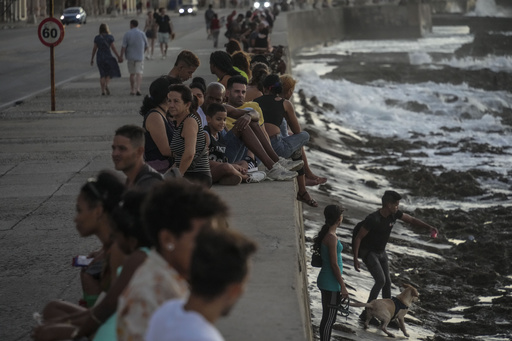
Havana is currently experiencing significant turmoil as many residents endure prolonged power outages, which have now lasted for three days. The situation has worsened with the arrival of Hurricane Oscar, bringing strong winds and heavy rain to the eastern coast of the island.
In the Santo Suárez neighborhood of southwestern Havana, numerous individuals took to the streets on Sunday night, expressing their frustration by banging pots and pans. Mary Karla, a mother of three, voiced her concerns, stating that their food was spoiling due to the extended lack of electricity. She lamented, “Four days without electricity is an abuse to the children,” highlighting the detrimental impact on families. The protestors, who are also without water, blocked streets with debris in their demonstrations.
Cuba’s Energy Minister, Vicente de la O Levy, addressed the situation in a recent press conference, indicating hopes for the restoration of the electricity grid by Monday or Tuesday morning. However, he cautioned that the arrival of Hurricane Oscar would complicate recovery efforts, particularly since it would affect key power generation areas, such as the Felton plant in Holguín and Renté in Santiago de Cuba. Although Oscar later weakened to a tropical storm, it was expected to continue affecting Cuba through Monday.
While some neighborhoods in the capital did see the return of electricity, large parts of Havana remained engulfed in darkness. The blackouts not only affect lighting but also disrupt essential services like water distribution, which relies on electrical pumps. Residents have resorted to cooking over makeshift wood stoves in the streets, desperately trying to salvage food from their refrigerators.
Emotions ran high as Ylenis de la Caridad Napoles, a mother of a 7-year-old, expressed her feelings of despair at the current situation. The failure of the Antonio Guiteras power plant last Friday led to a nationwide energy crisis, adding to a series of ongoing electricity distribution challenges in a country that has long struggled with energy shortages. The operational status of other power plants remains uncertain.
Long lines formed outside the few bakeries that managed to reopen, as residents waited hours to buy bread. For some, like Rosa Rodríguez, the outages have continued for four days, leaving them feeling overwhelmed. “We have millions of problems, and none of them are solved,” she remarked, referring to the difficulties of obtaining basic necessities.
Experts classify the current blackout as one of the worst Cuba has experienced since Hurricane Ian struck the island in 2022, severely damaging power infrastructure. Despite official claims of some restored electricity, the island’s grid has fallen short of the required energy supply, with only 370 megawatts available, a significant drop from the usual 3 gigawatts needed.
Even in a nation accustomed to power outages amidst an escalating economic crisis, this failure marks a critical moment. The Cuban government has implemented emergency measures to reduce electricity demand, which includes suspending classes in schools and universities, shutting down specific state-owned businesses, and halting nonessential services.
Authorities linked the outages to heightened demand from small and medium enterprises and residential air conditioners, along with failures in aging thermoelectric plants that have suffered from years of neglect, compounded by fuel shortages. Energy Minister de la O Levy noted that the grid could have been more stable if not for additional partial blackouts while attempting to restore power. He also mentioned that countries like Mexico, Colombia, Venezuela, and Russia have offered assistance.
